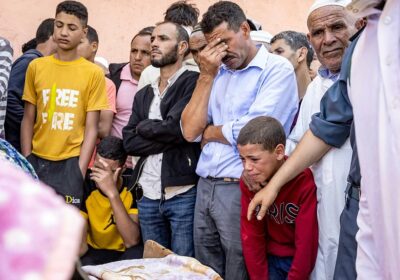Moroccans starting burying dead in first funerals since earthquake

Grieving relatives of Morocco earthquake victims start burying the dead after more than 2,000 were killed in disaster as country declares three days of mourning and rescuers continue desperate hunt for survivors
- Moroccans are burying the victims of the 6.8 magnitude earthquake
- Bodies are being buried as quickly as possible, in line with Islamic customs
- The earthquake has claimed the lives of at least 2,000 people so far
Moroccans have already begun burying their dead on the same weekend the country was rocked by its deadliest earthquake in 60 years, which has already claimed the lives of at least 2,000.
Funerals have been organised as quickly as possible in the wake of the 6.8 magnitude earthquake that hit the country just after 11pm local time on Friday night, in line with Islamic customs that require the dead to be buried as quickly as possible after death.
The funerals come as the country declared three days of national mourning in the country.
Bouchra, a resident of the small rural town of Moulay Brahim, 34 miles south of Marrakesh, spoke of the devastation wrought by the quake, as she watched others dig graves to bury its victims.
‘My cousin’s grandchildren are dead. I saw the devastation of the earthquake live, and I’m still shaking. It’s like a ball of fire that has swallowed up everything in its path’
Residents of Moulay Brahim were seen burying their dead the same weekend the earthquake hit
Mourners took the earthquake’s victims to a hillside cemetery
Bodies were seen wrapped in bright and colourful cloths
Dozens were seen digging graves for the victims of the 6.8 magnitude earthquake
The quick turnaround for funerals is in line with Islamic funerary customs
‘Everyone here has lost family, whether in our village or elsewhere in the region’, she added.
A procession of hundreds brought more than a dozen blanket-covered bodies to the town’s square, out in the open air, before they were brought to a nearby hillside cemetery to be buried.
Villagers in Moulay Brahim also erected a large tent in the town square, normally used to host large celebration, as an outdoor shelter for people who have lost their homes.
Moroccans across the country are doing the same, with millions fearing that their homes, often made of clay brick, may collapse on them in the coming days.
Marrakesk resident Fatema Satir said that many in the country’s capital were sleeping in the street for fear of their houses collapsing.
Morocco’s royal family have declared three days of mourning in the country
The devastating earthquake has already claimed the lies of at least 2,000, a number which is only expected to rise in the coming days
Morocco’s Interior Ministry said that another 2,000 people were injured, with 1,400 of these people in a critical condition
The earthquake struck Morocco’s Atlas Mountains and caused tremors as far away as Portugal
‘Look where all these people are sleeping. There is no help for us, our houses have been cracked, others destroyed like my daughter’s house, which was wiped out. We are in a chaotic state,’ she said.
The devastating earthquake has already claimed the lies of at least 2,000, a number which is only expected to rise in the coming days.
Morocco’s Interior Ministry said that another 2,000 people were injured, with 1,400 of these people in a critical condition.
Morocco’s royal family declared three days of national mourning after the deadly earthquake.
‘Three days of national mourning have been decided, with flags to fly at half-mast on all public buildings,’ said a statement published by the official MAP news agency after King Mohamed VI chaired a meeting to discuss the disaster.
The Red Cross has warned the next 24 to 48 hours are critical to saving lives of those trapped in rubble across the region
International aid groups said the humanitarian response for Morocco may take ‘months, if not years’
Some of the worst affected areas are remote and mountainous, creating additional hardships for rescuers
The earthquake struck Morocco’s Atlas Mountains and caused tremors as far away as Portugal.
The Red Cross has warned the next 24 to 48 hours are critical to saving lives of those trapped in rubble across the region, Sky News reports.
Some of the worst affected areas are remote and mountainous, creating additional hardships for rescuers.
Carol Holt, global head of operations for the International Federation of Red Cross and Red Crescent Societies (IFRC) said: ‘We know what to expect. There’s the need for the dignified management of dead bodies. There’s the need to provide people with safe water.
‘We need to make sure we don’t have a disaster within a disaster. Hygiene really needs to be maintained.
‘The next 24 to 48 hours will be critical in terms of saving lives.’
The IFRC is carrying out a review of the crisis and is preparing to send out its emergency response teams.
The organisation’s regional director Dr. Hossam Elsharkawi said the response could even take years to the disaster could last for ‘many months if not years’.
‘This will not be a week or two of response as our region has seen with the big Turkey and Syrian earthquakes earlier this year,’ he said.
Source: Read Full Article











